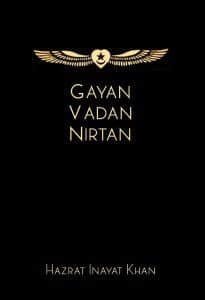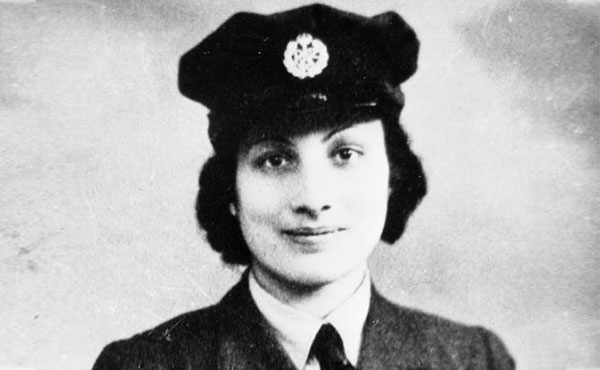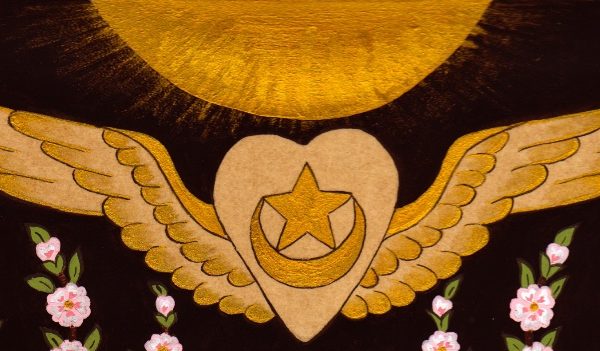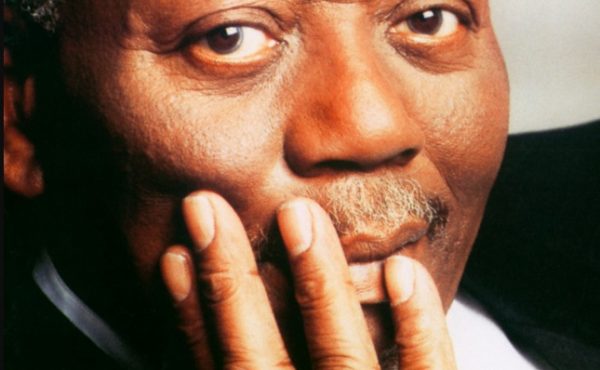24
2018By Shrabani Basu
Recently, I was privileged to attend the Zenith summer camp with Pir Zia in the Swiss Alps and talk about the contribution of Noor Inayat Khan as a secret agent in WWII. I was asked a question I am often asked: about how effective she was as a secret agent, and whether her alleged carelessness had cost lives.
This was raised again following an article about Noor Inayat Khan in the Daily Mirror newspaper in Britain.
I think it is best if I explain the situation and misunderstandings that have occurred.
The issue revolves around Noor’s notebook in which she wrote down her messages and transmissions. When she was arrested this notebook was discovered in her room along with all the details of her messages. It is said that this discovery by the Gestapo helped them to play her radio back and bring in more agents to the field, who were captured on arrival and sent to their death.
As Noor’s biographer, I have never shirked from the truth, so here is the real picture.
It is true that when Noor first arrived as a secret agent in Paris, she was often careless in houses of her friends and other ‘safe houses’, and left the notebook lying around. This was pointed out to her, and she tried to be careful after that.
It is also true that Noor’s notebook was discovered after her arrest with useful details for her captors as it contained her messages.
So, why did Noor not destroy the messages after she sent them?
The reason is that she was rushed to the field without finishing her training and because it was not explained clearly. All agents were told to be careful when ‘filing’ their messages. The instructors used the word ‘filing’ in the sense that newspaper reporters ‘file their stories’. Noor took it in a literal sense. She took it to mean ‘filing’ in a clerical sense and thought she had to maintain a ‘file’ of the messages. This is what she said to a fellow agent who asked he why she was keeping the messages. All ambiguity could have been saved if her trainers in Britain had simply said “Destroy all messages”. This would have been crystal clear and Noor would have followed instructions.
However, the main point is that simply having the notebook, did not give the Gestapo the means to play her radio.
Noor had been given a secret code by her code-master Leo Marks. It was a code that only she and Leo would know. When she was captured, Noor did send out the secret code to London. But it was not noticed by the girls de-coding the messages in London. Though Leo Marks had told them to look out for this special code in Noor’s messages, they missed it. When Leo finally saw it, he immediately knew that Noor had been captured. He told Maurice Buckmaster, but Buckmaster did not believe him either, and thought Noor may have made a mistake. As a result of this, agents were sent in to France on the request played by the Gestapo from Noor’s radio. Noor had sent her secret code. It was not her fault that London had slipped up.
The background to the radio games also needs to be noted.
The German secret service had been playing the radio game called Englandspiel even before Noor set foot on French soil. They had been using the captured radio sets of the English agents to play back the radio messages, thus deceiving the SOE in London.
The SOE soon got alerted to this and started doing two sets of checks for their agents. One was a bluff check which they could reveal to their enemy under pressure and one was a true check, which they would keep to themselves. The wireless operators in London receiving the messages were mean to look out for both checks. Noor’s true check had been given by Leo Marks, and she had sent it on her capture, but this had been ignored by the operators in London.
The London office had been careless on earlier occasions too. When Gilbert Norman, a radio operator was arrested, he sent both his checks. But when Leo Marks noticed it and pointed it out to Buckmaster, he simply thought Norman had been careless. This proved expensive as two Canadian agents were sent to France on Norman’s radio (which had fallen into German hands). The agents were arrested and their wireless sets and crystals were seized.
The Gestapo then played the radio sets of the Canadians. Noor herself was instructed by London to go to a café and meet the Canadian agents. Unknown to her, the Canadians had been arrested and the two people she met were actually German agents pretending to be Canadians. For the first time the Gestapo met her face-to- face and had a full description. They did not arrest her that day as they wanted to watch her. But Noor had been sent straight into a trap.
When Noor was arrested, other agents were sent to France on her radio set. If London had noticed her ‘true check’, this would not have happened.
It was not Noor’s carelessness that caused the deaths, but that of SOE’s own incompetence in London. In the fog of war, mistakes were made. But these were expensive mistakes as lives were lost.
21
2018Dear Companions on the Path,
I hope this finds you very well. I last wrote to you in the dog days of summer; now fall is nearly here. The wheel of time keeps rolling on. Sometimes the road is smooth, sometimes it’s stony. Through it all, the hub whirls.
While staying at Fazal Manzil in August I was able to teach the second-to-last session of the Jabarsa class of the Suluk Academy. Our subject was realization. The Jabarsa class will complete its two years of study in January, God willing. It’s a delightful group, wayfarers all.
After Suluk I received sad news from Afghanistan: Huzur Sayyid Ahmad Shah, the international leader of the Chishti Order and a truly beloved presence in my life, had passed away. I am so thankful to have known him, and to have had a treasured final meeting with him in Konya in July. Here is a brief reflection on the life and personality of this unique paragon of mystical love.
At the end of the month I made my way to Katwijk-aan-Zee in Holland for a retreat at the seaside Sufi Temple. On the last day, we gathered in silence in the dune in which Murshid communed with the Infinite in 1922, and which he named “Murad Hasil,” the place of wish fulfillment.

My family and I then returned from France to the U.S., leaving Rasulan in Paris for a semester of study abroad. Back in the States, I visited the Abode for a retreat over Labor Day weekend. It was wonderful to return to the Abode, and especially, to find it flourishing. I stayed in my old home, which has since become The Pir Vilayat Center, a house for focused Sufi study under the care of my esteemed friend Yaqin Aubert. Batina and Wahhab Sheets recently led a well-received month-long course there.
 Closing prayers in the Abode Herb Garden, with special guest Rabbi David Breitkopf from Jerusalem
Closing prayers in the Abode Herb Garden, with special guest Rabbi David Breitkopf from Jerusalem
Over the weekend we received more sad news: the great jazz master and friend of our Order, Dr. Randy Weston, had peacefully departed from the world at the age of 92. You will find my tribute to Dr. Weston here. At his memorial service at the Cathedral of St. John the Divine in Harlem, I was invited to recite Murshid’s homegoing prayer. The service was a powerful celebration of an extraordinary life and a moving evocation of the vibrancy of the transatlantic flow of African spiritual and artistic traditions in which Dr. Weston played such a crucial role. Vivid photos of the service, by Enid Farber, may be found here.
Back in Richmond, last week the new North American Suluk class convened at the Astana for its first five-day session. The subject of the session was concentration. The name of the class is “Naubahar,” meaning new spring. On the evening of September 13th, we celebrated Hejirat Day and the Urs of Pirzadi-Shahida Noor-un-Nisa. On the same day, celebrations took place all over the world: at the Dachau Memorial, at Gordon Square in London, at Fazal Manzil, and in many Sufi centers. Here is an inspiring account of the gathering at Dachau convened by Latifa Mancinelli and friends.
The centerpiece of our celebration of Pirzadi-Shahida Noor’s Urs was the unveiling of a magnificent portrait of Noor, which is now installed in the Meditation Room at the Astana. The portrait, by Suluk alumna Majida Nan Hill, portrays Noor on horseback, exuding idealism and dauntlessness. The story behind the painting may be found here. This is an icon that will doubtlessly be cherished by present and future generations of ashiqs, murids, heralds, and knights.
If the word “ashiq” is not familiar to you, I request your patience: I plan to say more about this word when I write again next month. Meanwhile, I am settling in here in Richmond and plans are in place to webcast our twice-monthly Gatha classes at the Astana, the first being this Sunday. To tune in, please follow this link: https://vimeo.com/290685270
God bless you.
Yours ever,
Sarafil Bawa
Portrait of Noor-un-Nisa Inayat Khan
Over the summer of 2018, the painter, Nan “Majida” Hill, created this portrait of the WWII heroine and daughter of Hazrat Inayat Khan, Noor-un-Nisa Inayat Khan. The portrait now hangs in the Inayati Order’s North American Headquarters, called the Astana, in Richmond, Virginia. Please continue reading to learn more about the artist and the story behind the portrait. Limited edition prints are available via the Inayati Order’s Online Store here: https://inayatiorder.org/shop/books/noor-un-nisa-portrait-print/
The Mysticism of Sound & Music Online Series: Fall 2018
Join us Thursday evenings in October at the Astana in Richmond, Virginia, or online any time, and experience the Sufi teachings of the Indian musician and mystic, Hazrat Inayat Khan (1882- 1927) with Pir Zia Inayat-Khan and special guest musician -in -residence, Sukhawat Ali Khan.
When: Thursday, October 4, 11, 18, and 25
Where: The Astana & Online
Price: $0-50
Gayan Commentary
Music of the Spheres: Gamaka Commentaries, Gayan
“If anyone throws it down, my heart does not break; it bursts and the flame coming rises from it, which becomes my torch.”
The human heart does not stay enclosed in the breast of its owner; in the course of day-to-day life it passes from hand to hand. One person holds it gently, another squeezes it, and still another hurls it down.
When the seat of one’s emotions is thrown to the ground, the injury is felt. How it is felt depends on the condition of the heart. If the heart is weak and rigid, it shatters and falls to pieces. Its pride is all it knows, and when that pride is ruptured there is nothing left.
If the heart is strong and flexible, instead of breaking it bursts. The “I” shines out, triumphantly revealing the light and life hidden within the shell of the self. Life’s vicissitudes do not dim the spirit within, but rather intensify it, as fuel to fire, so that it glows ever more brightly as the surrounding darkness deepens.
There is no better guide on the path than the heart’s own florescence when it has died as lump of flimsy pride and resurrected as a clear instrument of the light that is forever.
See the full commentary on the Inayati Order website, and please check back for updates.
Making One’s Own Nature with Pir Zia Inayat-Khan
1-2 December in Cambridge, MA – Register Now
Inayati Order Upcoming Events
NORTH AMERICA
Enemy of the Reich: The Noor Inayat Khan Story
Film Screening and Hub Talk w/ Pir Zia Inayat-Khan
Pleasanton, California
28 September 2018
Making One’s Own Nature w/ Pir Zia – SOLD OUT
Berkeley, California
29-30 September 2018
Making One’s Own Nature w/ Pir Zia
Cambridge, Massachusetts
1-2 December 2018
EUROPE
Angelic Lights w/ Pir Zia
London, England
17-18 November 2018
Please see our Inayati Order Programs Calendar for more event listings.
01
2018Another giant has left us: the revered Dr. Randy Weston (1926-2018) was a musical genius who sank his artistic roots deep into the soil of Africa and unfurled flowers of dazzling jazz. I had the great good fortune of speaking with him twice in the last year via video link, and was moved to learn how my grandfather had served as his muse since he chanced upon a copy of The Mysticism of Music and Sound in the early 1950s. For all his well-deserved success and fame, Dr. Weston was as unassuming, down-to-earth, and gentle-spirited a man as you will meet. He was going to grace us with a visit in Richmond in the fall, but alas it was not meant to be. My sincere condolences go out to his wife Fatoumata Mbengue, and to his children and grandchildren. May God gladden Dr. Weston’s gladness-giving soul in the Abode of Song.





